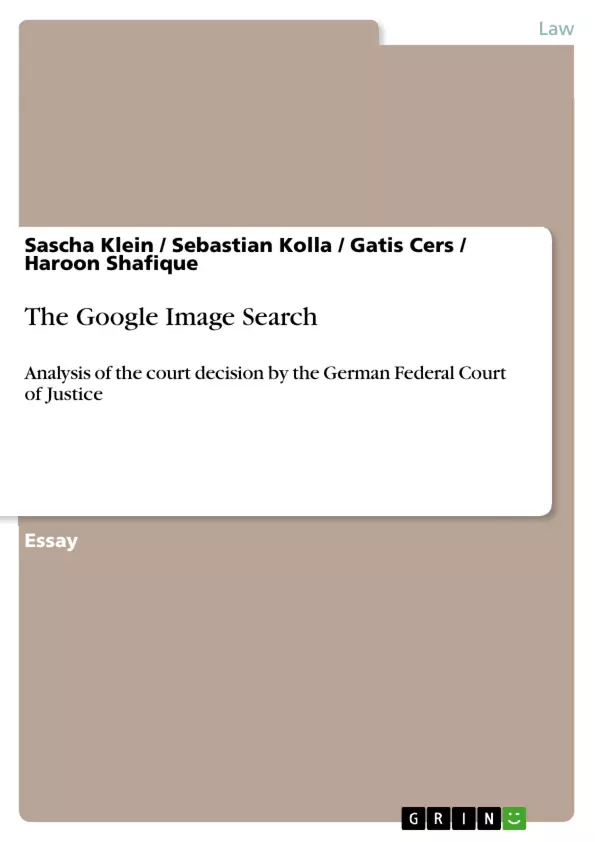The amount of available information on the internet has increased enormously throughout the last decade. Accordingly the search engines have improved and enhanced their features as well. One of these features is Google´s image search which was implemented in 2001. These search engines are an easy way to illustrate images; nevertheless on the downside some copyright law issues occur.
The dispute discussed is concerning the lawfulness of image search engines in Germany and was submitted to the Federal Court of Justice (Bundesgerichtshof).
Inhaltsverzeichnis (Table of Contents)
- The Google Image Search
- Analysis of the Court Decision by the German Federal Court of Justice
- Federal Court of Justice, April 29th, 2010¹
- The Amount of Available Information on the Internet
- The Dispute Discussed
- The Plaintiff is a Visual Artist
- The Defendant is the Well Known Search Engine Provider Google
- It is an Important Fact
- After the Plaintiff Googled Her Own Works of Art
- The Regional Court of Thuringia Dismissed the Action
- The Other Main Point
- The Main Legal Problem Here is the Issue of 'Transformative Use'
- German Federal Supreme Court on 29th April 2010
- In this Case the Plaintiff Stated
- Defendant's Answer Was
- Conclusion Made by Court
- As Discussed Above
- The Court's Concern Was
- However Some Dogmatic Problems Arise
- With Regard to the Liability of Google
- A Frequently Discussed Topic
Zielsetzung und Themenschwerpunkte (Objectives and Key Themes)
This text analyzes the German Federal Court of Justice's decision regarding the legality of Google's image search engine. It examines the legal aspects of copyright infringement, transformative use, and the liability of search providers. The case revolves around a visual artist's complaint about Google's use of thumbnails of her artwork in their image search results. The court's decision has significant implications for the balance between intellectual property rights and the accessibility of information in the digital age.
- Copyright Infringement and Image Search Engines
- The Concept of 'Transformative Use' in Copyright Law
- Liability of Search Providers for Unauthorized Content
- The Role of Technical Measures in Copyright Protection
- The Balancing of Author's Rights and Public Interest
Zusammenfassung der Kapitel (Chapter Summaries)
The text begins by outlining the increasing volume of information available online and how search engines, like Google's image search, have evolved to accommodate this. It introduces the case of a visual artist who sued Google for copyright infringement due to the use of thumbnails of her artwork in their image search results. The text then delves into the specifics of how Google's image search operates, detailing the process of indexing websites, generating thumbnails, and presenting search results.
The text then outlines the arguments presented by both the plaintiff and Google, highlighting the legal issues of copyright infringement, fair use, and the implications of posting content online. The legal arguments center around the question of whether Google's creation of thumbnails and their display in search results constitute a "making available to the public" that infringes on the artist's copyright.
The text then summarizes the court's decision, emphasizing the key points. The court decided in favor of Google, finding that the use of thumbnails did not infringe copyright. The court's reasoning revolved around the artist's implicit consent by posting her works online and the availability of technical measures to prevent indexing. The text further discusses the court's stance on Google's liability for third-party content, emphasizing the application of the Electronic Commerce Directive.
The final section of the text explores the implications of the court's decision, highlighting the potential impact on the balance between author's rights and the public's access to information. It also discusses the potential for the court's decision to expand Google's power in the realm of copyright law.
Schlüsselwörter (Keywords)
The text focuses on legal issues related to copyright law, specifically concerning image search engines and the creation of thumbnails. Key topics include copyright infringement, transformative use, the liability of service providers, and the balancing of author's rights with public interest. The case of Google France/Louis Vuitton, related to the E-Commerce Directive and the liability of service providers, is also highlighted.
Frequently Asked Questions
Is Google's image search legal under German copyright law?
The German Federal Court of Justice ruled in 2010 that Google's use of thumbnails in search results is generally lawful, provided certain conditions are met.
What is 'Transformative Use' in the context of image search?
It refers to using a copyrighted work in a new way or for a different purpose (like a search index) that doesn't substitute for the original work.
Why did the visual artist sue Google?
The artist claimed that Google's display of her artwork as thumbnails in search results without her permission constituted copyright infringement.
How does the court justify Google's use of thumbnails?
The court argued that by making images available on the internet without technical protection (like robots.txt), the author gives implicit consent to indexing by search engines.
Can artists prevent Google from showing their images?
Yes, the court noted that authors can use technical measures to prevent search engines from indexing their content if they do not wish their images to appear in search results.
- Quote paper
- Sascha Klein (Author), Sebastian Kolla (Author), Gatis Cers (Author), Haroon Shafique (Author), 2011, The Google Image Search, Munich, GRIN Verlag, https://www.grin.com/document/191343



